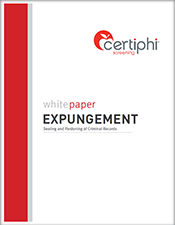Resource:
Expungement: Sealing and Pardoning of Criminal Records
This whitepaper examines the process of expungement, or the sealing and pardoning of criminal matters, and its implications.
 In the United States, once a criminal prosecution has been recorded in the public record, it typically remains there indefinitely. However, the processes of expungement, sealing and pardoning of criminal matters can affect their availability. This white paper examines each of these processes and the implications of each.
In the United States, once a criminal prosecution has been recorded in the public record, it typically remains there indefinitely. However, the processes of expungement, sealing and pardoning of criminal matters can affect their availability. This white paper examines each of these processes and the implications of each.
Today, at least forty-five states and the District of Columbia have a mechanism in place for criminal record sealing or expungement.1 However, both the use and definition of the terms “sealing” and “expungement” in the context of criminal records vary from state to state. Most often, “expunging” refers to an order to remove and destroy records so that no trace of the information remains and the “sealing” of a record refers to the procedure to segregate certain records from the court activity record information to ensure confidentiality to the extent specified in the state’s record sealing statute.2 “[S]tates have enacted [either an] executive, legislative, or judicial mechanism that permits the use of post-conviction remedies to soften the severity of collateral consequences that result from a conviction [or criminal record].”3 “Though the details can vary from one state to the next, most states’ laws provide that once an arrest or conviction has been expunged [or sealed], it need not be disclosed, including to potential employers or landlords.”4 Some states also choose to prohibit employers from considering or inquiring about sealed or expunged records—either in lieu of or in addition to permitting applicants to deny such records. In contrast, federal law offers expungement for first-time offenders on just one criminal offense: simple possession of narcotics.5
1 Michael H. Jagunic, NOTE, The Unified “Sealed” Theory: Updating Ohio’s Record-Sealing Statute for the Twenty-First Century, 59 CLEV. ST. L. REV. 161, 165-66 (2011) (citing Fruqan Mouzon, Forgive Us Our Trespasses: The Need for Federal Expungement Legislation, 39 U. MEM. L. REV. 1, 31 (2008)).
2 Id. (citing Elizabeth V. Tavares, Criminal Records: Sealing, Expungement and Impoundment, in Crime and Consequence: The Collateral Effects of Criminal Conduct § 21.3 (Hon. William J. Meade et al. eds., 2009)).
3 Lahny R. Silva, Clean Slate: Expanding Expungements and Pardons for Non-Violent Federal Offenders, 79 U. CIN. L. REV. 155, 157 (Fall 2010).
4 Expunging or Sealing an Adult Criminal Record, NOLO (last accessed May 8, 2015), available at http://www.nolo.com/legal-encyclopedia/expungement-of-criminal-recordsbasics- 32641.html.
5 Silva, supra note 3, at 157-58. The Federal First Offender Act, 18 U.S.C §3607(c) (2006) (providing for the expungement of disposition records for individuals found guilty of simple narcotic possession (21 U.S.C. §844) with no prior convictions). Id.
